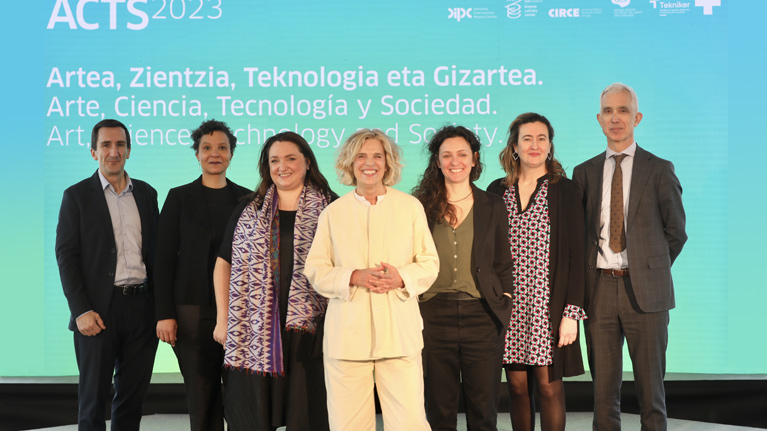A project to explore person-exoskeleton interactions
It is together with other research centres that Tekniker is currently involved in the CIRCE programme for which Tabakalera has received support from the German government to promote their line dealing with art, science, technology and society.

This third collaborative action involving Tekniker and Tabakalera will specifically address interactions between people and robots related to body-supporting machines such as exoskeletons to inspire user confidence.
The project forms part of the Creative Impact Research Centre programme (CIRCE) in which Tekniker is now involved subsequently to having been chosen by the German government as a research lab investigating support policies for the cultural and creative industries. CIRCE is a European think tank funded by the German Federal Government Commissioner for Culture and the Media (BKM) with funds from the European Commission’s Brexit Adjustment Reserve.
Thanks to this programme, Tabakalera will receive 300,000 Euros to carry out four projects throughout 2023 that will propose a collaborative methodology between artists and non-cultural organisations based on artistic practices. In addition to Tekniker, other initiatives developed together with the Basque Culinary Center Innovation, Donostia International Physics Center (DIPC) and the Basque Center on Cognition, Brain and Language (BCBL) have been selected.
The projects were presented during an event held at Tabakalera that featured Edurne Ormazabal and Clara Montero, the director general and cultural head of Tabakalera, respectively; Teresa Koloma, responsible for CIRCE; Ricardo Díez Muiño, director of DIPC; Begoña Rodríguez, director of BCC Innovation; Manuela Rizzoli, a BCBL researcher and Luis Uriarte, general manager of Tekniker.
A person-focused approach
Luis Uriarte explained that the third collaborative action between Tekniker and Tabakalera will explore issues related to communication and a quasi symbiotic, close relationship established between a person and the mobility provided by an exoskeleton. Exoskeletons deliver the support and assistance that a person needs to move and enhance their movements. The ultimate goal of this project developed in collaboration with the artist Amaia Vicente, proposes a multi-sensorial interface that will make it possible to improve interactions between robots and the people using them.
More generally speaking, it is a goal that Tekniker has already worked on in the areas of collaborative robotics and artificial intelligence in which the human being has always been placed in the centre of the development process.
As regards the project to be carried out by DIPC and Tabakalera, (Future Storage), research actions will address the future of digital storage and its eco-social and territorial implications. Architect Marina Otero, in collaboration with Harvard University, NASA engineer Eduardo Bendek and the Donostia International Physics Center are putting forward experimental models that redesign our relationship with data and how they are produced, consumed and preserved as a function of the diversity of information and externalities arising from their storage.
In the meantime, BCBL researcher Manuela Ruzzoli and the multidisciplinary artist Laura MM will collaborate in an innovative and experimental exhibition using AI and neuroscience to produce a unique experience. The aim is to explore how artificial intelligence can be used to create art that is unexpected and surprising for the spectator based on "violation of expectation" theories investigated at BCBL. Some Tabakalera users will be able to form part of the creative process as the project will include a free hardware proposal developed at Medialab to capture brain signals.
Food of the future
The collaboration between BCC Innovation, the gastronomy technology centre (Basque Culinary Center) and Tabakalera will focus on the Food Fictions project that will bring together several creative people from the world of art who, together with the chefs of the technology centre, will imagine what the food of the future will be like and also analyse the cultural, environmental and social implications. The project will specifically focus on the sensorial component and study how the stimulation of different senses influences the way we see the food we eat.
In November, Tabakalera will set up a major exhibition to showcase all the projects developed throughout the year as a way of making visible and sharing with the general public all the work done to date by artists and organisations within the framework of the line addressing art, science, technology and society.
More information in the press release.
